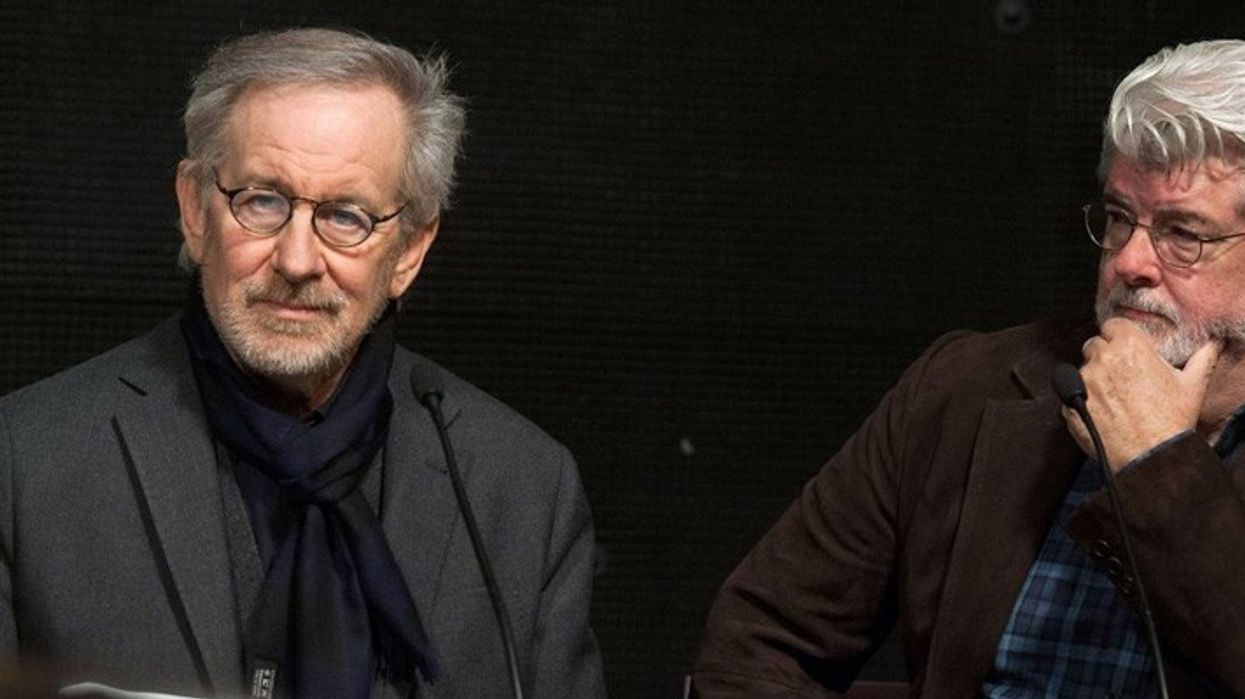Will Independent Film Survive the Spielberg/Lucas Cinemapocalypse Prediction?

By now, most of you have heard about Steven Spielberg and George Lucas predicting the "implosion" of the major studios and theatrical releases of films. With the growing popularity of VOD and self-distribution, the two veteran filmmakers explained that the old model is slowly but surely falling apart at the same time that a new one is being built in its place. The question is -- will independent film become a casualty to the change, or will it naturally fit into the framework of the new paradigm?
Spielberg and Lucas gave these dire predictions while speaking on a panel at the USC School of Cinematic Arts last week. According to them, major studios will decline and theatrical films will become a "niche market." Spielberg said:
They’re going for the gold, but that isn’t going to work forever. And as a result they’re getting narrower and narrower in their focus. People are going to get tired of it. They’re not going to know how to do anything else -- There’s eventually going to be a big meltdown --There’s going to be an implosion where three or four or maybe even a half-dozen of these mega-budgeted movies go crashing into the ground and that’s going to change the paradigm again.
So, what does this mean? What will the new paradigm look like? That remains to be seen, but one important point to remember is that moviegoers aren't going to just disappear. Just because theater attendance is declining and major studios are predicted to do the same doesn't mean that the desire to watch films is following suit. The audience will be looking elsewhere.
An article from Tribeca's Future of Film says:
It's not like the film industry's viewership is just disappearing into the ether; at this moment we are seeing a bloom of video content on web outlets, with Netflix's original programming perhaps being the harbinger of a totally new landscape of filmed entertainment. It goes without saying that never before has there been such a demand for filmed storytelling, nor have there been as many platforms and outlets through which to present it.
The ability of independent filmmakers to self-distribute through VODs and video sharing sites like YouTube and Vimeo instead of having to go through the theater circuit is only going to encourage independent production. The Future of Film article compares this new change to the music industry "collapse" -- how P2P networks, iTunes, and Amazon allowed new musical talent to find their own audiences -- smaller audiences maybe, but audiences nonetheless. Perhaps films will follow the same path since the distribution model is looking more similar every day.
And if Spielberg and Lucas are right in their appraisal of the future of the cinema, that means that the new norm will naturally become -- independent. Without a major studio system for a film to be made outside of, all films will technically become independent films, and perhaps the next question to ask is, "What will independent film be after the Cinemapocalypse?"
I'm not entirely convinced that we're about to experience the end of the wide theatrical release anyway. Spielberg and Lucas' prediction isn't new -- many have said similar things before. After VHS won the home theater war against Beta, the late 80s and early 90s saw a great influx of consumers and audiences buying up VHS players and VHS movies instead of theater tickets. The same predictions about the death of the cinema were made back then as attendance dropped at first-run theaters as well as at Dollar Theaters.
Audiences enjoyed the brand new option of watching a film inside the comfort of their own home, but theaters fought back. They built stadium-seating, developed IMAX and 3D technology, upgraded visuals and sound, and provided more and more screens to give their straying audience a better variety of films.
And theaters are still here some 20 or 30 years later. Perhaps the trick here is to not look at VODs and other new distribution platforms as disruptive technology, but as just another way to experience a product. Because honestly, there really isn't a way to recreate the experience of watching a film in a theater. There isn't a TV screen big enough, surround sound loud enough, or couch full of family and friends long enough to mimic that cinematic magic.
Having said that, that doesn't mean that everything will stay the same at the multiplex. Lucas suggests that:
You’re going to end up with fewer theaters, bigger theaters with a lot of nice things. Going to the movies will cost 50 bucks or 100 or 150 bucks, like what Broadway costs today, or a football game. It’ll be an expensive thing --
Whether we experience exorbitant prices at theaters or not in the future, independent film is going to profit from the majors' decline. It sounds morbid to say, but I think it may be true. However, that doesn't mean that indie film is going to cannibalize major pictures. Rather, their shares will be redistributed.
And as the foundation of traditional cinema shakes as its impending "doom" looms overhead, remember that few classic attributes of it actually disappear. The contours of the industry may be reshaped, but the material still remains. After over a hundred years we still have theaters. We still have movie stars. We still have independents. We even still have silent films.
The change is coming, but that means new opportunities for both majors and indies. The smartest thing to do is accept this and take advantage of it.
What do you think? Do you think Spielberg and Lucas are right in their predictions? What could this "implosion" mean for independent film?
Links:



 "'Back Home"via Mercedes Arutro
"'Back Home"via Mercedes Arutro 'Back Home'via Mercedes Arutro
'Back Home'via Mercedes Arutro 









